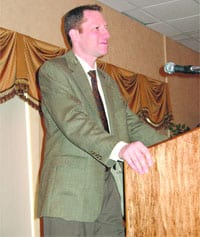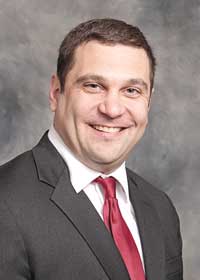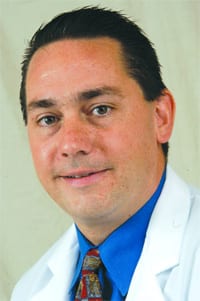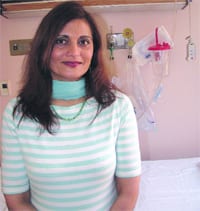Striking Back Annual Stroke Forum Stresses Recovery, Positive Outlook
Bob Swanson has come a long way in his recovery from a stroke. His voice still bears the telltale slurring, but his words are both deliberate and clearly understood. At the recent Stroke Survivor and Caregiver Forum, they were also applauded.
The winner of the Community Conscience Award at last year’s event, Swanson kicked off the 2007 forum with a quick description of the way stroke affects speech, coordination, and balance. But then he read his favorite quotation, by Helen Keller, to explain why his stroke hasn’t injured his spirit: “I seldom think about my limitations, and they never make me sad. Perhaps there is just a touch of yearning at times, but it is vague, like a breeze among flowers.”
That’s an important attitude, considering that one of the secondary effects of stroke is depression, said Dr. Barry Rodstein, medical director of the Inpatient Rehabilitation Unit at Kindred Hospital Park View in Springfield, who spoke to the forum attendees about medical issues following a stroke.
Of course, depression is hardly a surprising result, considering the way stroke robs people of mobility and makes the basic activities of daily life, from eating to dressing, much more difficult — not to mention the fact that it kills 150,000 Americans every year.
But the stroke forum isn’t about bemoaning a bad break. It’s about celebrating survival, and giving attendees plenty of advice for effective recovery and healthy living. In short, it’s about being more than a statistic.
To Educate and Inspire
More than 340 people attended the stroke forum, and many others were regrettably turned away, said Angela Minardi, communications director for the American Heart Association and American Stroke Association of Central and Western Mass. “Our number-one goal here is to raise awareness about stroke in the community,” she said.
And with good reason: some 700,000 Americans suffer a stroke each year — about one every 45 seconds — and it is the third-leading cause of death behind heart disease and cancer. In the African-American community, the outlook is even more dire, with about 69 stroke deaths per 100,000 people, compared to about 48 per 100,000 among white men and women.
A stroke occurs when a blood vessel that carries oxygen and nutrients to the brain is either blocked by a clot or bursts. Because each side of the brain controls the opposite side of the body, a stroke on the right side of the brain can bring about paralysis of the left side of the body, as well as memory loss and vision problems. Meanwhile, a stroke on the left side of the brain can cause paralysis on the right side of the body, in addition to memory loss and speech problems. Rodstein characterized stroke as a “brain attack,” striking without warning.
He also addressed the fear that many stroke survivors have of engaging in normal physical activity afterward, including sex, which in fact doesn’t require more energy than a brisk walk or a stair climb, and significantly less than a bicycle ride. “If you can walk up a flight of stairs, you know what you can do,” he said.
The forum also featured discussions by Eddie Lee, a speech and language pathologist at Kindred Hospital Park View, who addressed the effects of stroke on talking, thinking, and spasticity; and Patricia Cocozza, hospice bereavement coordinator at Baystate VNA & Hospice, who presented what she called “a fond farewell to ‘I can’t.’”
That was followed by a panel discussion with three stroke survivors: Jerome Irving and Paul Grunthart (see profiles, page xx), and Marissa Arnold, whose sudden stroke at Mount Holyoke College last fall was chronicled in the February 2007 issue of The Healthcare News.
The three were chosen to reflect the 2007 forum’s theme, “Stroke Across the Ages,” providing stark proof that stroke doesn’t discriminate by age.
But despite their differing life experiences, all three said their stroke and ensuing recovery gave them a new perspective on life; each has devoted time since their episode teaching others about stroke risk, effectively turning a negative into a positive.
Keep Fighting
Swanson can relate. As he concluded his address, he told those in the audience — both the ones recovering from stroke and the ones supporting them and fighting to make their lives better — “don’t give out, don’t give in, and don’t give up.”
On this day, no one was giving an inch.




